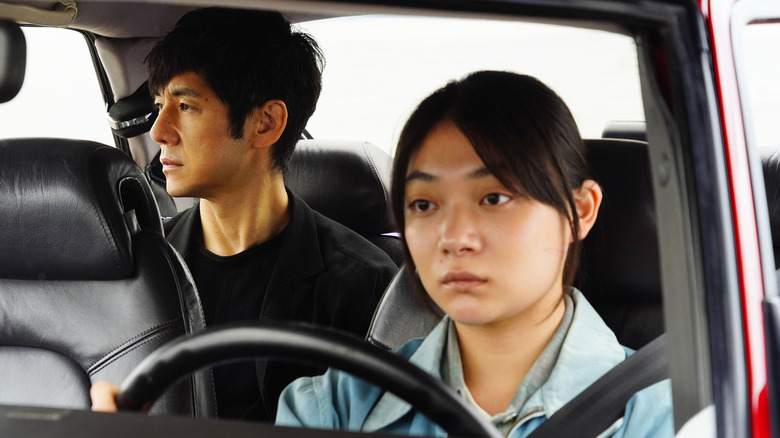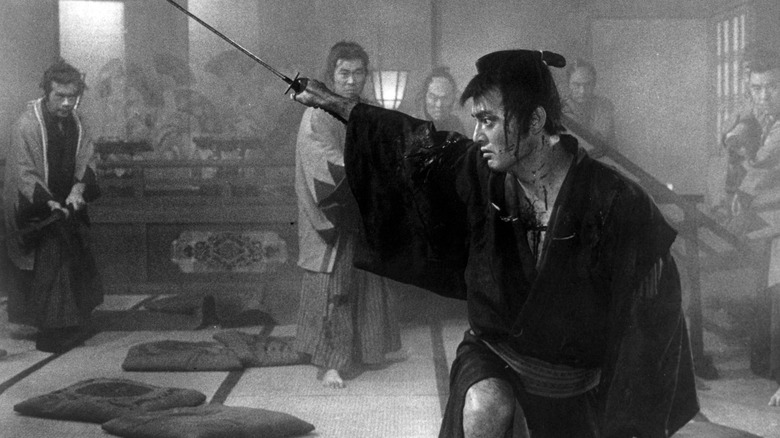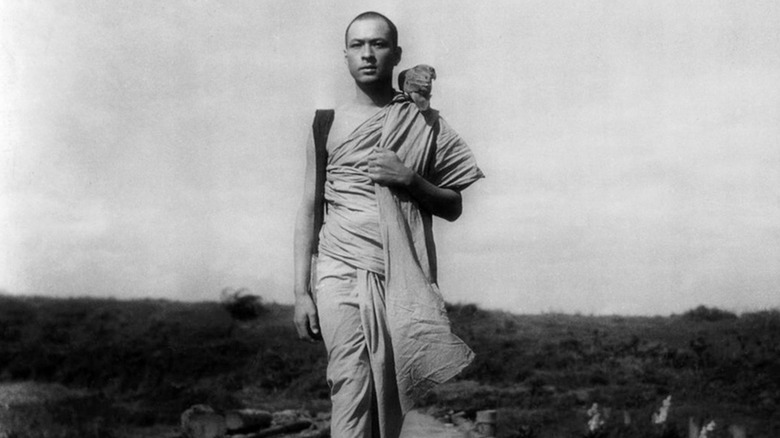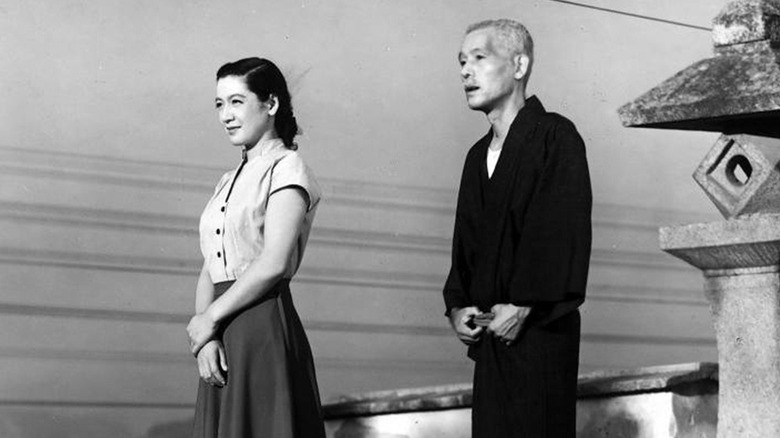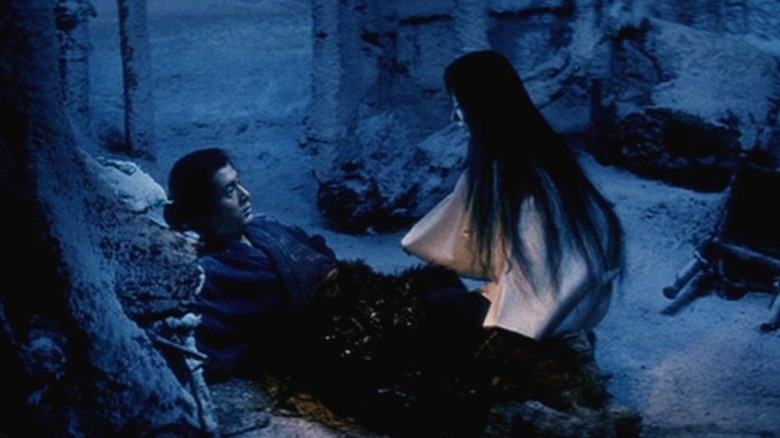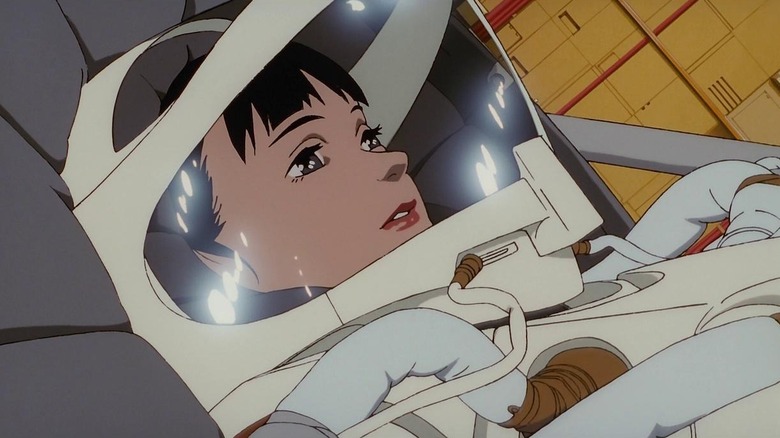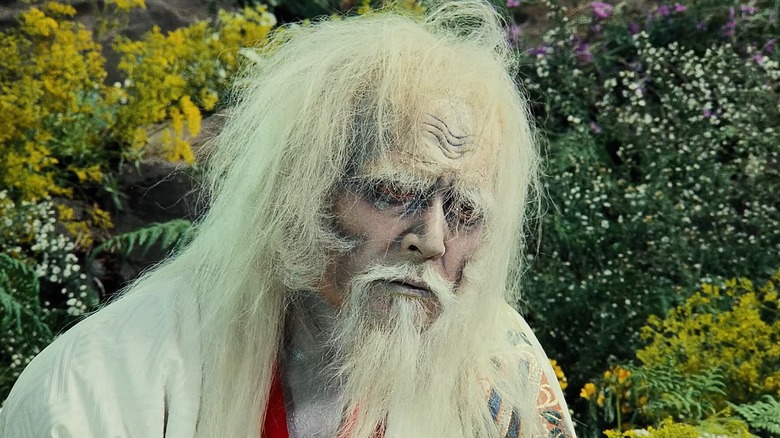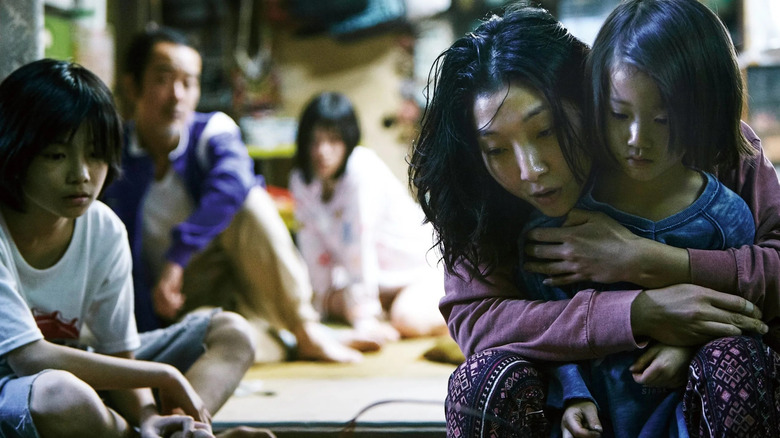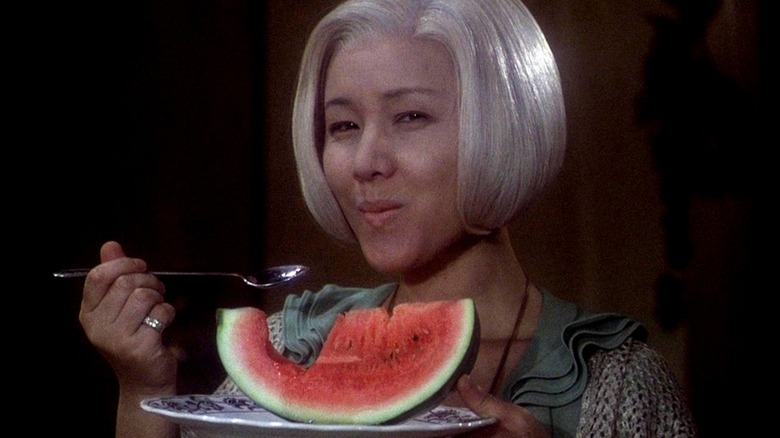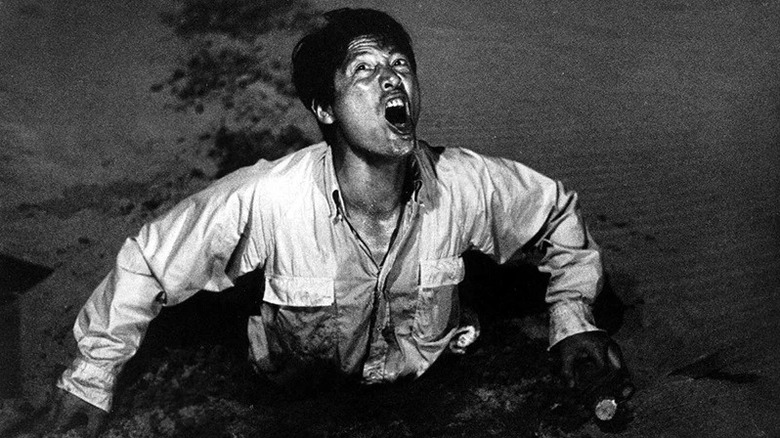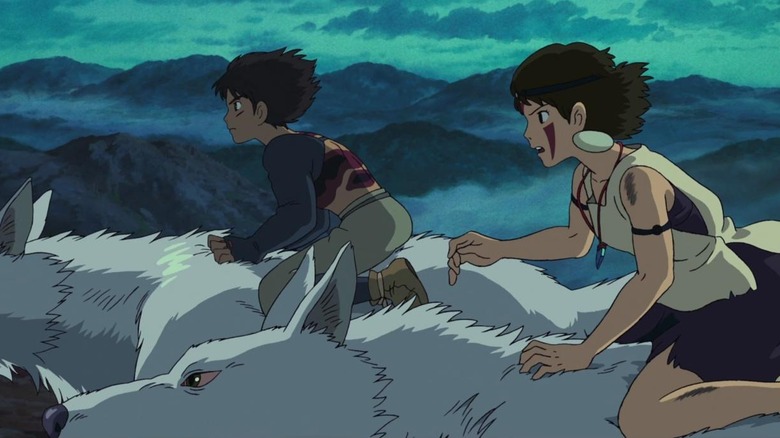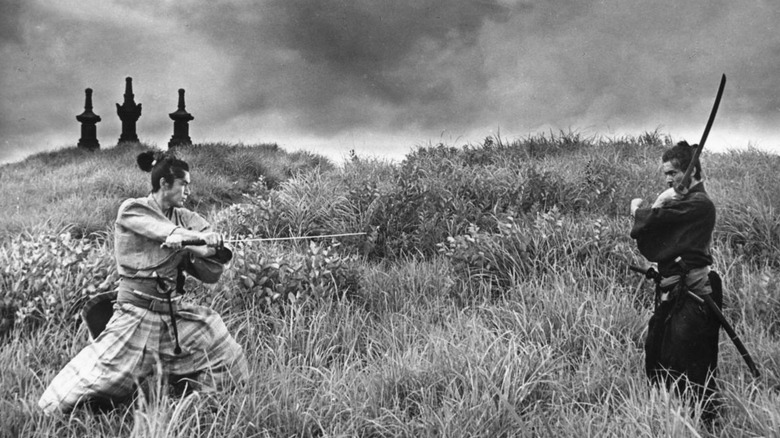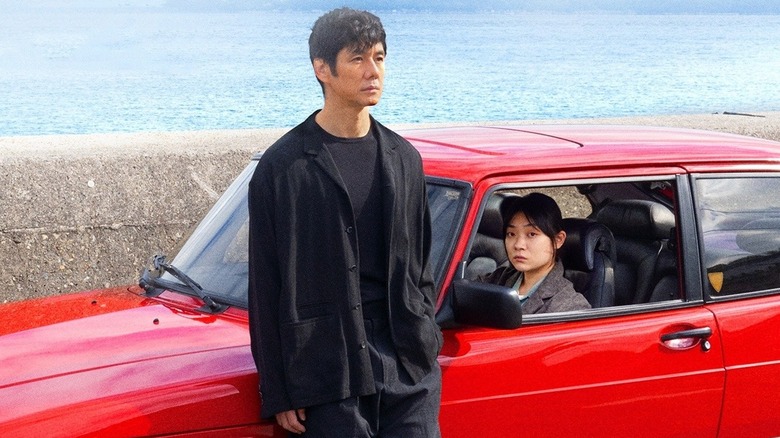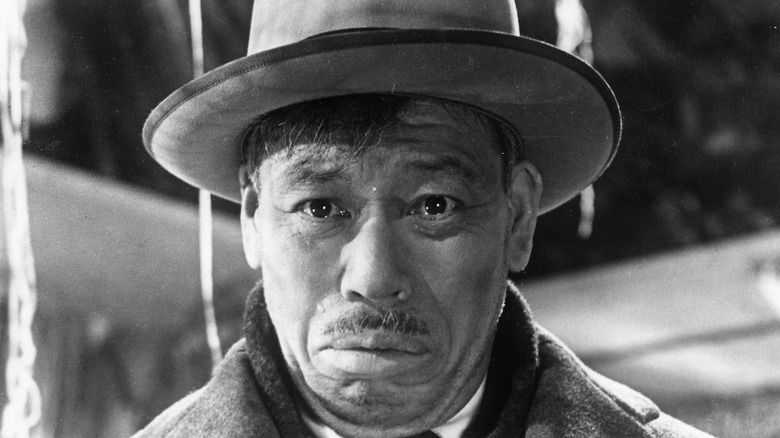13 Best Japanese Movies Of All Time, Ranked
From Akira Kurosawa to Hayao Miyazaki, Japan has produced some truly remarkable filmmakers over the decades. However, while many of the best Japanese movies share certain themes, each of the directors covered on this list has given something unique to cinema. From sweeping tales of shogun and samurai (no list of the best Japanese movies would be complete without one) to philosophical ruminations about the meaning of life, this list has something for everyone.
The truth is that Japan's track record when it comes to putting out memorable movies is staggering, so this list could have been a lot longer. Our goal here was to group together the cream of the crop and rank them from great to absolutely unmissable. The final order is based on critical reception, cultural impact, and the personal opinions of our writer. We're confident that you'll agree that the following 13 films are among the best ever made, no matter the country of origin.
13. The Sword of Doom
Kihachi Okamoto's "The Sword of Doom" is a staggeringly beautiful film that makes clever use of natural elements like snow and fog. Emphasizing the beauty in the weather provides a stirring organic contrast to a movie that's all about the follies of man. It chronicles the journey of Ryunosuke Tsukue (Tatsuya Nakadai), a morally gray samurai who joins the ranks of the Shinsengumi, a group of rōnin who keep order for the Tokugawa shogunate by any means necessary. He begins to doubt his status as a master swordsman when he witnesses a warrior whose skills surpass his own, and things become complicated for him when he learns that the younger brother of a man he killed a few years ago is out to get him.
There's murder and assassinations galore in this jidaigeki classic, a towering accomplishment of Japanese cinema that is not to be missed. Shinobu Hashimoto's carefully crafted screenplay means that the dialogue hits as hard as every jab and slash, and there are plenty of top performances from the supporting cast, which includes the late Toshiro Mifune, who was named as one of the 50 best actors of all time by Empire magazine.
-
Cast: Tatsuya Nakadai, Yūzō Kayama, Toshiro Mifune
-
Director: Kihachi Okamoto
-
Year: 1966
-
Rating: Not Rated
-
Runtime: 122 minutes
-
Where to Watch: Criterion Channel, Amazon Prime Video, Apple TV+, Fandango
12. The Burmese Harp
Kon Ichikawa's "The Burmese Harp" is among the first films to show the impact that World War II had on regular Japanese soldiers. It focuses on those who fought in the Burma Campaign and follows Private Mizushima (Shoji Yasui), whose duties included playing his harp and singing to raise morale. He goes on a spiritual journey after he encounters some British soldiers who inform him that the war has ended, doing his best to convince his comrades in the field to surrender rather than fighting to the death. All the while, his superior Captain Inouye (Rentarō Mikuni) searches for him, hoping that he's still alive.
The contemplative nature of Mizushima's journey of self-discovery combined with the visual depiction of war's grisly consequences are what make "The Burmese Harp" one of the best World War II movies of all time. Whether it's in weaving grand tableaus of wartime misery or intentionally claustrophobic imagery reflecting prisoner of war experiences, the movie's cinematography is as distinctive as it is human. This profoundly moving feature is the kind of art that gets stuck in your head — like an especially stirring melody played on a harp.
-
Cast: Rentarō Mikuni, Shôji Yasui, Jun Hamamura
-
Director: Kon Ichikawa
-
Year: 1956
-
Rating: Not Rated
-
Runtime: 117 minutes
-
Where to Watch: Criterion Channel, Darkroom, Amazon Prime Video
11. Tokyo Story
Yasujirō Ozu's "Tokyo Story" is a deeply intimate movie about elderly couple Shūkichi (Chishū Ryū) and Tomi (Chieko Higashiyama), who are traveling to Tokyo to see their children and their grandchildren. It's a visit full of familial strife (Shūkichi and Tomi feel as though they've been abandoned by their offspring) and one that also contains sobering reminders of our mortality. Just watching one of her grandchildren playing has Tomi thinking about how life is so finite, and that filters through to the viewer via an idiosyncratic filming style that relies on unblinking single-takes.
Ozu's immersive shooting style makes the audience feel as though they're right there with this family, experiencing all of the highs and lows. "Tokyo Story" is highly absorbing from start to finish, a memorable chronicle of everyday existence elevated by an outstanding performance from Japanese icon Setsuko Hara. This quietly tender yet unflinching film was voted the third best of all time in a 2012 poll by the British Film Institute, behind only "Citizen Kane" and "Vertigo."
-
Cast: Chishū Ryū, Chieko Higashiyama, Setsuko Hara
-
Director: Yasujirō Ozu
-
Year: 1953
-
Rating: Not Rated
-
Runtime: 137 minutes
-
Where to Watch: Criterion Channel, Kanopy, Plex, Max, Amazon Prime Video, Apple TV+, Fandango
10. Kwaidan
Anthology films tend to have at least one below-par entry, but Masaki Kobayashi's "Kwaidan" truly has no weak links. This Japanese horror anthology from the '60s holds up amazingly well, with zero duds to be found in its quartet of stories. Ominous atmospheres and spellbinding visuals abound across all these yarns. That latter quality especially makes "Kwaidan" such a must-see movie — it's no exaggeration to say this is one of the most deliciously concocted films ever in terms of imagery.
With magnificent production design and heavy deployment of rich colors, Kobayashi and company consistently create striking backdrops, accentuating a fairy tale aesthetic. Good luck not getting obsessed with shots juxtaposing bright snow-covered grounds with vivid orange skies or gorgeous images capturing something as simple as a person standing in a field. The runtime absolutely breezes by thanks to all the glorious filmmaking in "Kwaidan," the pinnacle of anthology cinema.
-
Cast: Tatsuya Nakadai, Rentarō Mikuni, Misako Watanabe
-
Director: Masaki Kobayashi
-
Year: 1964
-
Rating: Not Rated
-
Runtime: 183 minutes
-
Where to Watch: Criterion Channel, Max, TCM, Amazon Prime Video, Apple TV+, Fandango
9. Millennium Actress
The late, great Satoshi Kon gave us some of the most memorable anime films ever, from "Perfect Blue" to "Paprika." His most critically acclaimed feature is "Millennium Actress," which is not only one of the best anime films of all time, but one of the best Japanese films, period. Loosely based on the lives of Hideko Takamine and the aforementioned Setsuko Hara, it's about two documentary filmmakers interviewing former acting star Chiyoko Fujiwara about her time in the industry and why she abandoned it.
As is usually the case with Kon works, audiences quickly find themselves questioning where reality ends and fantasy begins as Chiyoko retells the story of her life. Endlessly inventive animation helps propel "Millennium Actress" to incredible artistic heights, and the cherry on top is that it intersects with raw emotions rooted in real portions of Japanese history. This movie is a masterful blending of the stylized and the down-to-earth, one that other filmmakers would struggle to nail. Kon does so with aplomb, all while reminding viewers of the joys exclusive to animated cinema.
-
Cast: Mami Koyama, Fumiko Orikasa, Shōzō Iizuka
-
Director: Satoshi Kon
-
Year: 2001
-
Rating: PG
-
Runtime: 87 minutes
-
Where to Watch: Crunchyroll, Amazon Prime Video, Peacock, Shout! Factory, Fandango, Apple TV+
8. Ran
The late Akira Kurosawa is widely regarded as the most influential Japanese filmmaker of all time, so it probably won't surprise you to learn that he has more than one movie on this list. The first of these is 1985's "Ran," an adaptation of Shakespeare's "King Lear" that is truly wondrous in its use of colors. Red and yellow hues dominate the screen in everything from flags to blood drenched walls, while every costume is also laced with vibrant hues. The unforgettable palette is paired with impeccable control behind the camera, as Kurosawa executes expansive battle sequences and intimate depictions of vulnerability with equal finesse.
"Ran" is peak epic cinema, with its depiction of familial betrayal and how thirsting for power corrupts all. Among the film's many idiosyncratic qualities separating it from other "King Lear" adaptations are the vivid visuals Kurosawa uses to depict stark changes in characters, such as elderly warlord Hidetora Ichimonji's (Tatsuya Nakadai) radically different appearance once madness takes hold of him. The story follows Ichimonji and his three sons after his decision to abdicate plunges his kingdom into chaos. Kurosawa's visual command flows through his entire filmography, but it's especially striking in "Ran."
-
Cast: Tatsuya Nakadai, Akira Terao, Jinpachi Nezu
-
Director: Akira Kurosawa
-
Year: 1985
-
Rating: R
-
Runtime: 162 minutes
-
Where to Watch: Tubi, Amazon Prime Video, Kanopy
7. Shoplifters
Hirokazu Koreeda's Palme d'Or winner "Shoplifters" shines a light on a side of Tokyo seldom seen in movies, following a found family as they turn to stealing to make ends meet. It's an emotional rollercoaster with several memorable scenes, none more so than the one in which matriarch Nobuyo Shibata (Sakura Ando) comforts young girl Yuri (Miyu Sasaki), who Nobuyo and her makeshift family of shoplifters have "adopted" into their clan. After Yuri talks about getting hit by her birth family, Nobuyo wraps her arms around her and says: "If they say they hit you because they love you, that is a lie. If they loved you, if they really loved you, this is what you do."
It's a devastating sequence, especially since one gets the feeling that Nobuyo grew up in similar circumstances to Yuri. In this moment, a grown woman is reassuring a real child in the here and now and her wounded inner child. Koreeda's film about societal outsiders comes with plenty of moral complexity (Nobuyo and her husband basically kidnap Yuri from her abusive household), challenging viewers to think about right and wrong and what really makes a family. It was a big hit both abroad and at home, with The Japan Times calling it "an eloquent look at the human condition."
-
Cast: Lily Franky, Sakura Ando, Kirin Kiki
-
Director: Hirokazu Koreeda
-
Year: 2018
-
Rating: R
-
Runtime: 121 minutes
-
Where to Watch: Tubi, Peacock, Roku, Amazon Prime Video, Fandango, Apple TV+
6. House
"House" is one of the best horror comedy films that you've probably never seen. Screenwriter Chiho Katsura and director Nobuhiko Obayashi's unique vision for "House" concerns Gorgeous (Kimiko Ikegami) and her friend group venturing out to a remote country home owned by her aunt. Not long after their arrival, surrealist supernatural occurrences transpire that begin eliminating the film's lead characters. All the over-the-top mayhem is realized through detailed sets and a barrage of perplexing imagery involving everything from dismembered heads to gigantic cartoon cat shadows and so much more.
Juxtaposing a commitment to incredible visuals with brain-shattering mayhem makes this one-of-a-kind production extra fun. It's also a hoot that Katsura and Obayashi let their imaginations run wild in "House" and just deliver whatever seems fun in the moment. This includes an early sequence introducing Gorgeous and her pals like they're starring in a cheesy 80s sitcom and a piano being played by a bunch of severed fingers. You never know where this film is going to go next, and that's part of what makes it so great. "House" and its many wonders must be seen to be believed.
-
Cast: Kimiko Ikegami, Miki Jinbo, Ai Matubara
-
Director: Nobuhiko Obayashi
-
Year: 1977
-
Rating: Not Rated
-
Runtime: 88 minutes
-
Where to Watch: Max, Criterion Channel, Amazon Prime Video, Fandango, Apple TV+
5. Woman in the Dunes
Hiroshi Teshigahara's avant-garde psychological thriller "Woman in the Dunes" won a Special Jury Prize at the Cannes Film Festival and was nominated for two Academy Awards, including best director. It follows troubled entomologist Niki Junpei (Eiji Okada), who is traveling to look for insects when he gets trapped in a sand dune hut. He has to help the unnamed widow of the dunes (Kyōko Kishida) collect sand from a pit for the monetary gain of nearby villagers.
"Woman in the Dunes" is a magnificent triumph in many respects, but it's especially memorable for its unnerving use of close-up shots. With Junpei trapped in close quarters, he can't help but closely observe everything that lands in his line of sight. The camera tightly examines bugs trapped between fingers, grains of sand lingering on naked bodies, and an array of other things populating Junpei's confined hut. With this kind of captivating filmmaking, it's no wonder "Woman in the Dunes" is still wowing critics decades later.
-
Cast: Eiji Okada, Kyōko Kishida, Kōji Mitsui
-
Director: Hiroshi Teshigahara
-
Year: 1964
-
Rating: Not Rated
-
Runtime: 146 minutes
-
Where to Watch: Criterion Channel
4. Princess Mononoke
Studio Ghibli co-founder Hayao Miyazaki is behind many memorable movies, but perhaps his most complete work is "Princess Mononoke," the film that announced him on the international stage. Set during Japan's Muromachi era, it's the tale of a prince who is forced to leave his people behind in search of a cure for his cursed arm. The curse gives him supernatural powers, but will claim his life if he cannot find a remedy. Prince Ashitaka soon finds himself caught up in a conflict between the industrial stronghold Irontown and San, a human girl raised by wolves who seeks to put an end to the town's rampant deforestation.
It's a sweeping epic that seems like a fairytale on paper but is actually way more violent than Miyazaki's other movies — we're talking bullet wounds, severed limbs, and even decapitations. None of this is gratuitous, however, nor does it distract from the magic of the world Miyazaki crafts here. "Princess Mononoke" is ultimately a love story, not just between a young man and a young woman, but between a director and the natural world. Miyazaki's reverence for nature runs through most of his films, though the ecological message is at its most impactful here.
-
Cast: Yōji Matsuda, Yuriko Ishida, Yūko Tanaka
-
Director: Hayao Miyazaki
-
Year: 1997
-
Rating: PG-13
-
Runtime: 134 minutes
-
Where to Watch: Max, Amazon Prime Video, Fandango, Apple TV+
3. Harakiri
Though it's a Jidaigeki film set in the 1600s, Masaki Kobayashi's classic "Harakiri" is relevant in any era — at its core, it's about challenging power and resisting tyranny. The film follows a rōnin called Tsugumo Hanshirō (Tatsuya Nakadai), who asks for permission to commit Harakiri (a form of ritualistic suicide by disembowelment practiced by samurai as part of their code of honor) in a palace owned by the Li Clan. Once inside, he reveals his story to the assembled samurai and we soon come to realize that there's more to his request than meets the eye.
This multi-layered, non-linear saga forces viewers to consider how morality is often a privilege. While well-off folks like the Li Clan can cling to traditionalism, the likes of Hanshirō have no choice but to grapple with the sometimes devastating nuances of everyday life. "Harakiri" reminds us how the rich can unfairly demonize the poor and how the so-called truth can get corrupted by the 1%. The emotionally captivating story and the sharp filmmaking are timeless, and it also contains some of the most realistic katana combat ever put to film. It's no wonder that it's regarded by many as the best samurai movie ever made.
-
Cast: Tatsuya Nakadai, Rentarō Mikuni, Akira Ishihama
-
Director: Masaki Kobayashi
-
Year: 1962
-
Rating: Not Rated
-
Runtime: 135 minutes
-
Where to Watch: Criterion Channel, Amazon Prime Video, Apple TV+
2. Drive My Car
Director Ryusuke Hamaguchi's Oscar-winning drama "Drive My Car" is the newest film on this list, but it deals with age-old issues. It stars Hidetoshi Nishijima as Yūsuke Kafuku, an actor who forms an unlikely relationship with a young woman named Misaki (Tōko Miura) when she's hired to drive him following a glaucoma diagnosis. During their journeys together, Yūsuke opens up about his unresolved feelings about his late unfaithful wife, while Misaki reveals that she had a chance to save the life of her abusive mother following a landslide in their hometown but chose not to.
Hamaguchi's understated filmmaking style is perfect for this tale of grief and redemption. In an interview with Filmmaker magazine, he explained that he allowed his actors a lot of freedom in order to capture more genuine interactions and that many of the best scenes unfolded by pure "coincidence." If that's the case, then luck was clearly on his side during the making of "Drive My Car," because it's gripping from start to finish. The film reminds viewers that no two people cope with trauma the same way, but sometimes a good piece of art can make us realize we're at least not alone in those struggles.
-
Cast: Hidetoshi Nishijima, Tōko Miura, Reika Kirishima
-
Director: Ryusuke Hamaguchi
-
Year: 2021
-
Rating: Not Rated
-
Runtime: 179 minutes
-
Where to Watch: Max, Amazon Prime Video, Fandango, Apple TV+
1. Ikiru
Kanji Watanabe (Takashi Shimura) is dying. That's what the opening scene of "Ikiru" indicates. This man working lifelessly inside a bureaucratic Tokyo institution is terminally ill, and the film follows him as he decides to live his remaining days to the fullest. It's a simple idea executed masterfully by Akira Kurosawa in what we believe to be his best movie — ranking Kurosawa's movies from worst to best is no simple task, but "Ikiru" is the one that stays with you the longest after the credits have rolled.
A mournful atmosphere seeps into every inch of this film, which makes the kind gestures all the more impactful. That aching ambiance especially flourishes thanks to Shimura's performance. If you want proof of why he was one of the greatest actors to ever live, just watch his quietly towering work in "Ikiru," which means "to live." He cements the film as an enthralling exploration of mortality and legacies. Together, Shimura and Kurosawa created one of the most impactful movies of all time, Japanese or otherwise.
-
Cast: Takashi Shimura, Shinichi Himori, Haruo Tanaka
-
Director: Akira Kurosawa
-
Year: 1952
-
Rating: Not Rated
-
Runtime: 143 minutes
-
Where to Watch: Criterion Channel, Max, TCM, Amazon Prime Video, Fandango, Apple TV+
